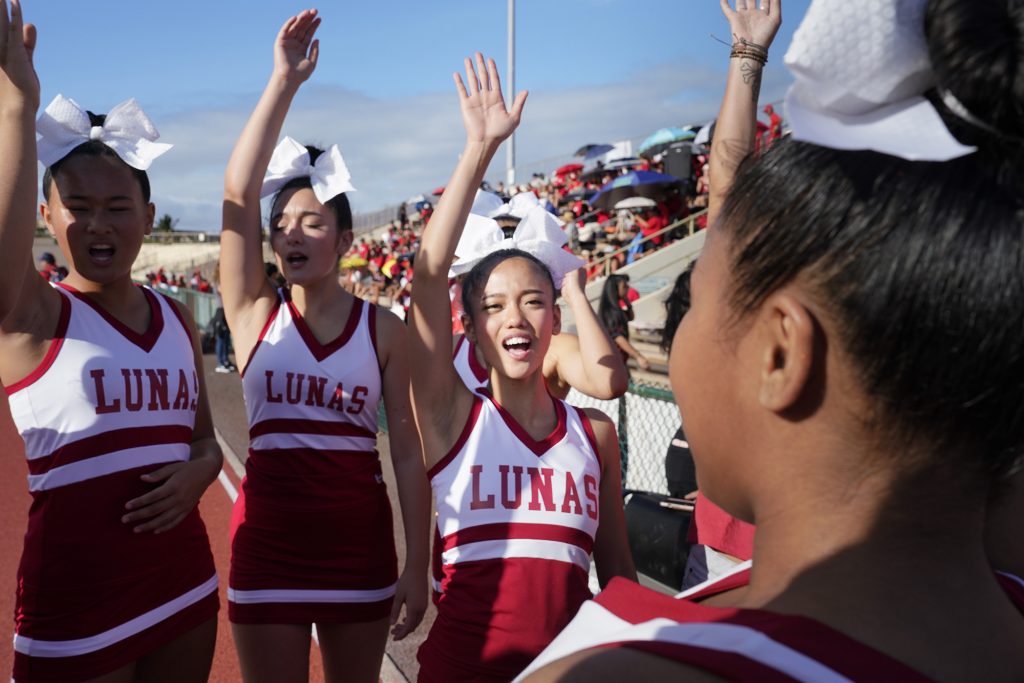High school sports are a quintessential community experience. They bring together neighbors, families, friends and even rival politicians to cheer on their hometown teams. The atmosphere buzzes with the energy of the crowd, the bright stadium lights and the players’ excitement on the field.
Tomorrow, my hometown team, Mililani High School will face Kahuku in the First Hawaiian Bank Football State Championships, and as I am once again away from home, I’ve already begged my sister to FaceTime the game with me.
Let me start by admitting that balance is my only physical skill, which means I can stand up on a paddleboard and manage most one-footed yoga positions. All high school sports were beyond my capabilities. Fortunately, my sister has infinitely better hand-eye coordination, quicker reflexes and a longer attention span so I had plenty of time to observe the community-building power of team sports.
I’m one of those people who only likes sports if it’s the Olympics or the World Cup, though I’ll watch anything at the Stan Sheriff Center if it includes garlic fries. High school sports, however, are an entirely different proposition.
For a spectator, nothing rivals attending a public high school football game. The sheer volume of players, cheerleaders, and band members ensures you’ll have a sizeable crowd of supporters who will meet every play with cheers, groans and gasps. Emotions are palpable at these games, and it’s not only as the outcome of the game hangs in the balance.
The camaraderie, the teamwork and the unwavering determination of Hawaii’s youth on the field are inspirational. These teams bring together players from different backgrounds and different social circles to rally around a common goal. High school sports give players and the community around them a sense of belonging that’s missing in many of our lives.
Feeling that we don’t belong impacts every area of our lives, leading to depression, anxiety, stress and poor physical health. Youth who participate in team sports are more resilient to these outcomes. Research suggests that high school athletes have higher levels of academic performance, fare better in the labor market, experience fewer mental health issues and better health later in life. They are also more likely to volunteer, vote, and follow the news closely.

As adults, we should support our youth when they choose to dedicate their time and energy to a team. With mental health issues and absenteeism rising amongst Hawaii’s teens, supporting local athletes is a positive way to reverse the state’s downward trends. But getting involved with your local team, or at least attending a game, can also help strengthen your broader community.
When communities come together to cheer on their local teams, it creates a sense of shared identity and a common purpose that is hard to find elsewhere. These collective experiences create bonds across barriers that have value beyond sports because these ties are the same ones we call on when our communities face hardships and disasters.
Last month, we saw Maui residents converge on Wailuku’s War Memorial Stadium to support Lahainaluna’s football team in their first game of the season due to the devasting fires. As Civil Beat’s Paula Dobbyn reported, the “game that many describe as the lifeblood of Lahaina” provided the community with an opportunity to trade stories, share frustrations, find hope and heal together.
Kahuku’s Red Raiders provide another great example. In January, NFL 360 featured the Red Raiders in short documentary, Kahuku Mana, that showcased the team’s enduring impact on its North Shore community.
As Kahuku Head Coach Sterling Carvalho explained to NFL 360 viewers, “We’re the heartbeat of this side of the island. And how the football team goes, the community goes.”
The piece shows supporters with red flags and shirts lining the streets before every game to wish the team well and interviews the mentors that helped the team process the untimely deaths of both coaches and players. It highlights that investing in these community bonds builds a system of resilience, pride and a sense of shared responsibility that surpasses the sport itself.
While Lahainaluna and Kahuku High Schools are exemplars, each of our communities has the opportunity to follow in their footsteps and rally around the teams that can both improve the lives of Hawaii’s youth and build stronger communities that know how to celebrate, mourn and overcome together.

<!–  –>
–>
<!– Sign up for our FREE morning newsletter and face each day more informed. –>
Sign up for our FREE morning newsletter and face each day more informed.
Sorry. That’s an invalid e-mail.
Thanks! We’ll send you a confirmation e-mail shortly.
